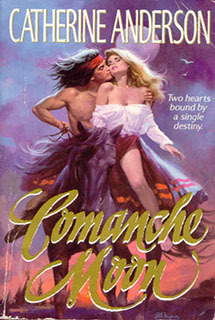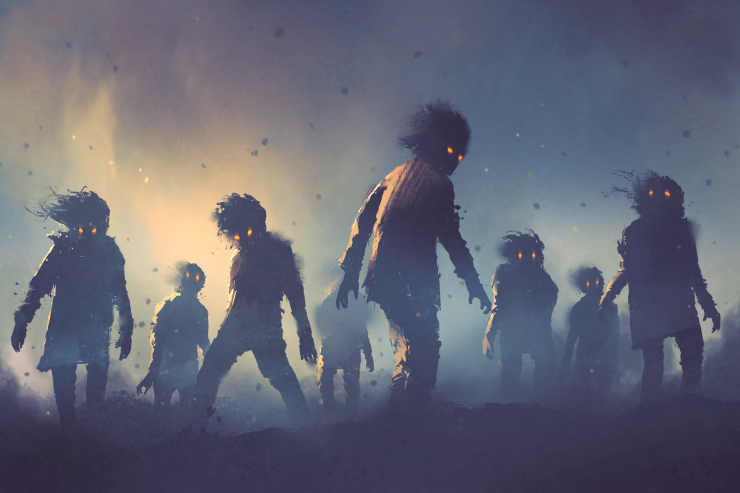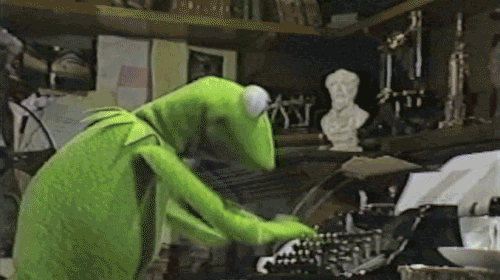 Texas, 1864. While the American Civil War is fought to the east, white settlers and the Comanches are busy fighting a war of their own, leaving a lot of sore hearts behind. Loretta Simpson’s parents were killed by a Comanche war party ,and the trauma of witnessing the attack has left her mute. Hunter of the Wolf (“Hunter”) in turn suffered his own damages after watching his pregnant wife die after a brutal rape at the hands of white raiders. Both think the other’s people are cruel barbarians, and have no desire to have anything to do with the other. Hunter especially, as his mother prophesied long ago about a blond woman who would steal his heart and sever him from his people irrevocably.
Texas, 1864. While the American Civil War is fought to the east, white settlers and the Comanches are busy fighting a war of their own, leaving a lot of sore hearts behind. Loretta Simpson’s parents were killed by a Comanche war party ,and the trauma of witnessing the attack has left her mute. Hunter of the Wolf (“Hunter”) in turn suffered his own damages after watching his pregnant wife die after a brutal rape at the hands of white raiders. Both think the other’s people are cruel barbarians, and have no desire to have anything to do with the other. Hunter especially, as his mother prophesied long ago about a blond woman who would steal his heart and sever him from his people irrevocably.
This is the stage Catherine Anderson sets in Comanche Moon, what seems to be by far the most popular of the massive array of Native American romances that flooded the market a few decades ago. Regency might rule the day right now and always, but it seems that at one point Western/Native romances were giving it a run for its money. (I was recently at a massive library sale and virtually every book pre-2000 had either a cowboy or Indian on the cover.)
When one thinks of Native American/Western romances from the 80s and 90s, one does not generally think of good things. The consensus I’ve gathered from many corners of Romancelandia seems to agree: these books are not great. I had only read one such book, prior to Comanche Moon—another book about a feisty white woman and the “savage” halfbreed who sought to tame her. I didn’t like it. At all. I was prepared to enjoy this one only because: A) it’s generally regarded as “The Best”, and B) I’ve enjoyed Catherine Anderson’s writing previously. Lucky for me, I did enjoy Comanche Moon, and this isn’t going to be an exhausting recap of the book’s flaws.
If her own word is to be believed, Anderson devoted 4 years of research into the writing of this book, and she brought a genuine respect, admiration, and love of Comanche culture into this story. I’m not an expert, so I can’t speak to accuracy, and while I’m aware that intentions aren’t everything, I was happy with the book’s approach to Indian culture as a whole. Reading this book, I never got the feeling that the author had just decided to stick an Indian protagonist into her narrative because it would be more “dramatic” or what have you. Hunter’s background and way of life were explored in detail, and though Loretta was obviously very prejudiced against him in the beginning, her opinions regarding “Savages” were overturned before long. Again, I can’t speak to accuracy, but I didn’t feel uncomfortable with what was happening in this book.
In general, this is a very grand romance—an epic. The scope of Comanche Moon is wide and sweeping, the obstacles that impede our couple’s happily ever after are insurmountable, and the stakes are impossibly high. This isn’t a sweet, gentle romance about two nice people meeting and figuring out if they can be a couple. This is a story of Destiny, where the hero and heroine were Fated By The Gods to be together, in spite of the trials they must overcome to make it happen. This is intense. High on drama, high on emotion, and, ultimately, high on the pay-offs.
Sometimes when you read romances, you think to yourself “oh, yes, this is wonderful; these characters are just like real people” and you finish the book feeling comforted that you’ve just walked through a rose-tinted, more palatable version of everyday life. And then there are times when you read a book like this, when you’re like “this would literally never happen, what on earth???” but it’s still somehow okay, because you’ve willingly given up your expectations of realism when you turned to the first page.
Are the odds high that you’d be a mute, orphaned daughter with a rapey uncle who lets an aggressive Comanche buy you for 50 horses? Is it likely you’ll finally escape the Comanche only to have to run back to him the very next day so he can rescue your 12-year-old cousin who’s just been kidnapped by rapey Mexicans? Is it probable you’ll agree to suspend your fear and marry the dude, fall in love with him and his excellent lovemaking skills, only to find out that the people in his camp are the ones who murdered and raped your mother? Is it reasonable to ride off into the sunset with this dude, after somehow overcoming your huge prejudices and justifiable fears about his people, with the intent of starting a new multi-ethnic utopia somewhere “out West”?
Uh, no. Really no.
It’s just not realistic, Loretta. It’s just not.
But the near-absurdity of the plot is somehow okay, because this is an Epic Romance and it feels natural to have such sweeping drama present from page 1 to “The End.” I felt like Comanche Moon was a lot of fun to read, and was addicting in the way only this kind of book can be. After 6 or 7 years of in-depth reviewing and voracious reading, it takes a lot to get me so into a book I wish I could stay up late to finish. I felt that way with this. And that’s important.
If Comanche Moon is the best that Native American romance has to offer, then I’m happy to have read it. (Also worried, because it can only go down from here, right?) I like the way Catherine Anderson writes, and I feel that she did as well with her material as could have been expected. For someone who really enjoys her Georgian and Victorian romances, this was a nice vacation to a different locale, with a lot of excitement and emotion to keep me entertained along the way.
Title: Comanche MoonSeries: Comanche #1
Author: Catherine Anderson
Published: 1991
Rating: 3/5 Advertisements Share this:






